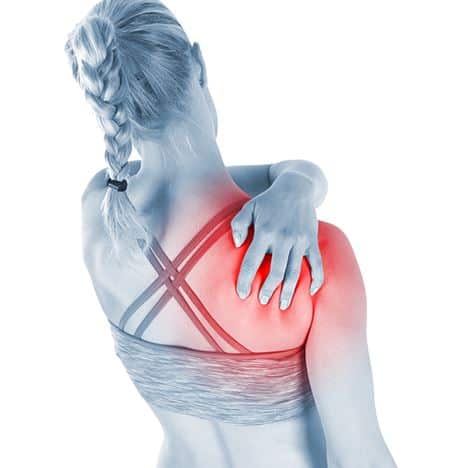Arm and shoulder pain is quite common amongst all age groups. Many a time there is no clear differentiation as to whether or not the pain is caused by the neck, or if it’s coming from the shoulder.

Where Is The Pain Coming From?
Determining the exact origin of pain in the arm is important, as it helps us to develop a management plan that is focused on the exact origin of the problem. Therefore utilising the correct treatment techniques and rehabilitation methods to get clients pain free and back to full function.

Our Neck And Shoulders Can Cause Referred Arm Pain
Our neck and shoulder are connected anatomically and can both cause referred arm pain. Neck problems can cause referred pain all through your arms, as well as your hands and fingers; the pain is usually more like a dull ache.
Referred Arm Pain From The Neck
Arm pain that originates from the neck is more of a widespread pain that is difficult to pinpoint. There can be associated symptoms such as pins and needles, numbness, heaviness, tingling and a sharp electric shock-like pain.
Arm Pain That Originates From The Shoulder
Arm pain that originates from the shoulder, is usually more localised to the upper arm, the shoulder blade and the mid-back. This pain is usually sharper, creating a pinching feeling when you move your arm in certain positions and can be easy to localise. There may also be a dull ache that is constantly present while movements can cause sharp pain.
Lorem ipsum dolor sit amet, consectetur adipiscing elit. Ut elit tellus, luctus nec ullamcorper mattis, pulvinar dapibus leo.Lorem ipsum dolor sit amet, consectetur adipiscing elit.

Arm pain that originates from the neck can be worse at the end of the day or in the mornings. Whereas shoulder originating arm pain tends to be worse during the day, after using the arm all day at the end of the day.
Whether you have arm pain that originates from the neck or the shoulder, there is a specific set of strategies to both alleviate the pain and get you back to your normal activities.
The first step is seeing your Physiotherapist, who can help you to diagnose your problems correctly and set up the right management plan for you.
This blog was written by Kunj Desai from the Christies Beach practice.